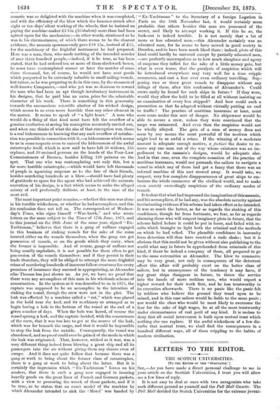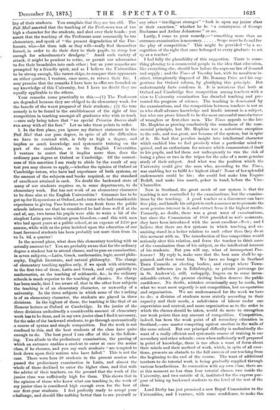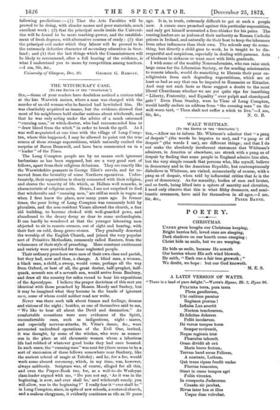LETTERS TO THE EDITOR.
THE SCOTCH UNIVERSITIES.
LTO THE EDrfOR OF THE "SPECTATOR."]
Sia,—As you have made a direct personal challenge to me in your article on the Scottish Universities, I trust you will allow me a few lines of reply.
It is not easy to deal at once with two antagonists who take such different ground as yourself and the Pall Mall Gazette. The Pall Mall derided the Scotch Universities for the extreme juveni-
lity of their students. You complain that they are too old. The Pall Mall asserted that the teaching of the Professors was of too high a character for the students, and shot over their heads ; you assert that the teaching of the Professors must necessarily be too elementary, and speak of "the present degradation of the Pro- lessors, who—let them talk as they will—really find themselves 'forced, in order to do their duty to their pupils, to stoop low enough for schoolmaster's drudgery." Amid such variety of attack, it might be prudent to retire, or permit our adversaries to fire their broadsides into each other ; but as your remarks are -prompted by a friendly spirit, and as I believe the Universities to be strong enough, like turret-ships, to conquer their opponents on either quarter, I venture, once more, to return their fire. I may premise that the remarks I have here to offer are founded on my knowledge of this University, but I have no doubt they are equally applicable to the others.
Your remarks come practically to this :—(1) The Professors are degraded because they are obliged to do elementary work, for the benefit of the worst prepared of their students ; (2) the true -remedy is to be found in the establishment of the right of free competition in teaching amongst all graduates who wish to teach —care only being taken that "no special Priratim Docens shall run away with all the fees." Let us take these points in order.
1. In the first place, you ignore my distinct statement in the Pall Mall that our pass degree, in spite of all the difficulties we have to contend with, is fully as high a degree, and implies as much knowledge and systematic training on the part of the candidate, as in the English Universities. I venture to assert that it implies more than does the ordinary pass degree at Oxford or Cambridge. Of the correct- ness of this assertion I am ready to abide by the result of any test you may choose to apply,—whether the opinion of Oxford or Cambridge tutors, who have had experience of both systems, or the amount of the subjects and books required, or the standard of excellence attained in each. No doubt the backward state of many of our students requires us, in some departments, to do elementary work. But has not work of an elementary character 'to be done also at the English Universities ? Grammar has to be got up for Responsions at Oxford, and a tutor who had considerable experience in giving Pass lectures to men fresh from the public schools informs me that he considered he had done well if at the .end ef, say, two terms his pupils were able to write a bit of the simplest Latin prose without gross blunders,—and this with men who had spent years at a public school, at an expense of £250 per annum, while with us the price lavished upon the education of our :least favoured students has been probably not more than from 5s. Ito 7s. 6d. a quarter !
In the second place, what does this elementary teaching with us -actually amount to? You are probably aware that for the ordinary .degree a student has to attend classes, and to pass an examination, in seven subjects,—Latin, Greek, mathematics, logic, moral philo- sophy, English literature, and natural philosophy. The charge of elementary teaching applies only, if we speak with strictness, to the first two of these, Latin and Greek, and only partially to mathematics, as the teaching of arithmetic, &c., in the ordinary -schools is much superior to the teaching of classics. No charge has been made, that I am aware of, that in the other four subjects the teaching is of an elementary character, or unworthy of a university. In the three subjects in which some of the teaching is of an elementary character, the students are placed in three -divisions. In the highest of these, the teaching is like that of an Honour lecture at Oxford or Cambridge. In the junior of the three divisions undoubtedly a considerable amount of elementary 'work has to be done, and in my own junior class I find it necessary, for the sake of the backward students, to go through systematically .a course of syntax and simple composition. But the work is not -confined to this, and the best students of the class have quite enough to do. The best proof I can offer of this is the follow- ring. You allude to the preliminary examination, the passing of which on entrance enables a student to enter at once the senior -class, if he chooses, and you say such students "are tempted to look down upon their seniors who have failed." This is not the -case. There were here 28 students in the present session who passed the preliminary examination in Latin, and almost the whole of these declined to enter the higher class, and that with the advice of their teachers, on the ground that the work of the junior class was sufficiently high for them. This shows that in the opinion of those who know what our teaching is, the work of any junior class is considered high enough even for the best of our first-year students. I feel perfectly ready to accept your challenge, and should like nothing better than to see yourself or any other "intelligent stranger" "look in upon my junior class at their exercises," whether he be "a countryman of George Buchanan and Arthur Johnstone" or no.
Lastly, I come to your remedy,—" something more than an entrance-examination is necessary Scope must be found for the play of competition." This might be provided "by a re- cognition of the right that once belonged to every graduate to set up as a teacher."
I feel fully the plausibility of this suggestion. There is some- thing pleasing to a commercial people in the idea that education, like everything else, should bow before the supreme law of demand and supply ; and the Times of Tuesday last, with its usual true in- stinct, triumphantly disposed of Mr. Bonamy Price and his sug- gestions for Oxford reform, by glorifying this principle. But unfortunately facts condemn it. It is notorious that both at Oxford and Cambridge free competition among teachers with a view to University examination has dwarfed teaching and pre- vented the progress of science. The teaching is dominated by the examinations, and the competition between teachers is not as to who shall advance knowledge and kindle interest in a subject, but who can prove himself to be the most successful manufacturer of wranglers or first-class men. The Times appeals to the late Mr. Hopkins as proving conclusively the soundness of the com- mercial principle, but Mr. Hopkins was a notorious exception to the rule, and was great, not because of the system, but in spite of it. lie had that peculiar insight into intellectual character which enabled Min to feel precisely what a particular mind re- quired, and an enthusiasm for science which communicated itself to his pupils, and led them not unfrequently to run the risk of losing a place or two in the tripos for the sake of a more genuine study of their subject. And what was the position which the University could give the man who, according to the Times, was enabling her to fulfil her highest ideal ? None of her splendid endowments could be his ; she could but make him Esquire Bedell, and make him march, poker in hand, before the Vice- Chancellor.
Now in Scotland, the great merit of our system is that the teaching is not controlled by the examinations, but the examina- tions by the teaching. A good teacher or a discourser can have free play, and handle his subject in such a manner as to promote the most genuine interest in it, and extract from it the highest results. Formerly, no doubt, there was a great want of examinations, but since the Commission of 1858 provided us with assistants, they have been introduced with the most excellent effect ; and I believe that there are few systems in which teaching and ex- amining stand in a better relation to each other than they do at this moment with us. The introduction of free competition would seriously alter this relation, and force the teacher to think more of the examination than of his subject, or the intellectual interest of his students. But you will say, what of incompetent Pro- fessors? My reply is, make sure that the best man shall be ap- pointed, and then trust him. We have no longer in Scotland Town Councils as electing bodies ; and except where Town- Council influence (as in Edinburgh), or private patronage (as in St. Andrew's), still, unhappily, lingers on to some incon- siderable extent, the present electing bodies deserve the public confidence. No doubt, mistakes occasionally may be made, but what we want most urgently is not competition, but co-operation and organisation. We are undermanned for the work we have to do ; a division of students more strictly according to their capacity and their needs, a subdivision of labour under one supervision and control, and more organisation as to the order in which the classes should be taken, would do more to strengthen our weak points than any amount of competition. Competition, indeed, has been the weak point of all secondary education in 'Scotland,—one master competing against another in the walls of the same school. But our principal difficulty is undoubtedly the want of a really efficient and systematic course of training in our secondary and other schools ; even when sufficiently well prepared in point of knowledge, there is too often a want of form about their minds and their method of work, which, in spite of all exer- tions, presents an obstacle to the full success of our teaching from the beginning to the end of the course. The want of additional teachers to do tutorial work is being gradually supplied through various benefactions. In connection with my own class, there arc at this moment no less than four tutorial classes, two inside the University, and two outside of it, instituted for the express pur- pose of bring up backward students to the level of the rest of the class.
Lord Derby has just promised a new Royal Commission to the Universities, and I venture, with some confidence, to make the
following predictions :—(1) That the Arts Faculties will be proved to be doing, with slender means and poor materials, much excellent work ; (2) that the principal needs inside the Universi- ties will be found to be more teaching-power, and the establish- ment of fresh degrees, with alternative courses of study ; (3) that the principal evil under which they labour will be proved to be the extremely defective character of secondary education in Scot- land ; and (4) that the last things which the Commissioners will be likely to recommend, after a full hearing of the evidence, is what I understand you to mean by competition among teachers. —I am, Sir, &c., University of Glasgow, Dec. 20. GEORGE G. RAMSAY.




































 Previous page
Previous page